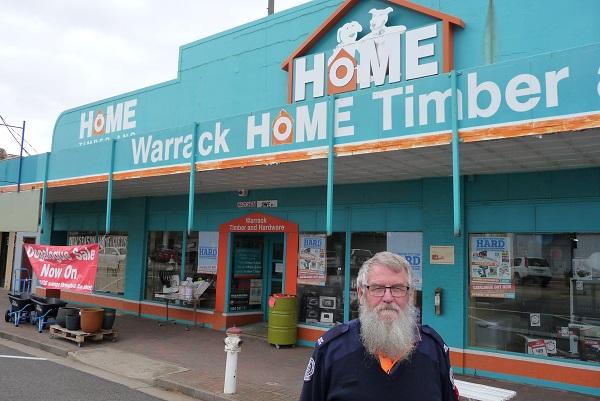Combining a day job with being a volunteer needs great flexibility from both the volunteer and their employer.
Following on from our chat with Ray Glendenning of Wangaratta Motor Group/Everton Fire Brigade, we speak to two more volunteers about how they manage to juggle work with keeping their communities safe.

Colin Newell, Warracknabeal Fire Brigade
Colin has been a volunteer at Warracknabeal Fire Brigade in District 17 for over 50 years, and has worked at Warracknabeal Home Timber and Hardware for 25 years. Fortunately the fire station and shop are across the road from each other, which makes it easy when there’s a call-out.
“When there was a call-out I used to sprint across,” Colin said with a laugh.
“But I’m not as quick now; it’s more like a brisk walk.”
Colin is also the group officer for Warracknabeal Group, which comprises 13 brigades. He’s proud of the camaraderie between brigades in his area, noting that anyone from any brigade can jump on the back of any truck in his group of brigades, and respond to an incident.
He says there have been plenty of changes in his time as a volunteer.
“Previously there were a few more fires. Now there are less because the population is becoming better educated.
“But the fires are faster and more furious than before, and farmers don’t have the bare paddocks in between that used to slow them down.”
Colin notes that his work will always accommodate him when he‘s needed by the community. In 2011 Warracknabeal experienced significant flooding, and an 8.6-kilometre wall of earth was built to protect the town. Colin’s employers led the charge during the town’s time of need.
“They were massive during the floods, absolutely. They essentially rallied everyone together and built the levee, which helped protect the town.”
Although this incident stands out for Colin, he said Warracknabeal Home Timber and Hardware and its staff have always been supportive.
“I’ve had three bosses during the time I’ve worked here and they’ve all been exactly the same - absolutely fantastic. “If there’s an incident, they just say ‘go mate’.
“I usually open the store but if I have to go out they always get cover for me. So it’s not just the boss, but the other guys who work in the store are always happy to cover for me.”
“They know that the community needs this. It’s important for all businesses to be like this and, to their credit, Home Timber and Hardware has always been fantastic.”

Jamie Atkins, Tesbury Fire Brigade
Although his employers are based in another state, Jamie Atkins said they know and understand when duty calls. And for the Captain of Tesbury Fire Brigade, five minutes out of Camperdown in District 6, this was certainly the case in March this year.
“The St Patrick’s Day fires were very close to home,” said Jamie.
“I was gone for seven days. There was obviously a lot to do. When I got back I offered to take leave for my time, but my boss wouldn’t hear of it.”
For the past 30 years Jamie has worked on a farm in Tesbury as a manager/carpenter for Emanuel Brothers, a company based in Condingup, Western Australia.
“My employer Jonathon Emanuel, and before that his father Tim, has always been supportive of me in carrying out my duties with CFA,
both in terms of time and resources.
“They are farmers in small communities and they understand I need to help. I have a company ute fitted with three radios and all the other things I use on a fireground.”
He’s been captain of Tesbury brigade for 25 years so has seen plenty in his area and elsewhere.
“During the Sydney 2001 fires I was on holidays and I ended up being deployed there. When I got home, my boss gave me back the leave I’d used up fighting fires.”
Jamie speaks humbly about his own impressive service to CFA, preferring to heap praise on his employer, and makes a point to credit those who are self-employed as well.
“I thank my guys after every turnout as most of these guys are self employed dairy farmers. They can’t just drop tools and pick them up days later.
Their cows need milking twice a day, so they need to employ relief milkers at their own expense.
“They do this without hesitation, knowing that when we have something in our patch the favour will be returned by fellow Victorians or interstate firefighters.
“This is what makes CFA a very special organisation.”
Author: Tim McGlone